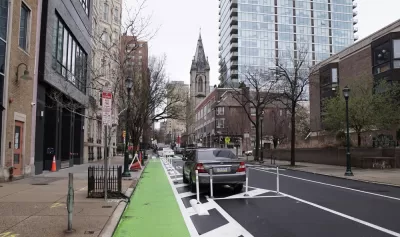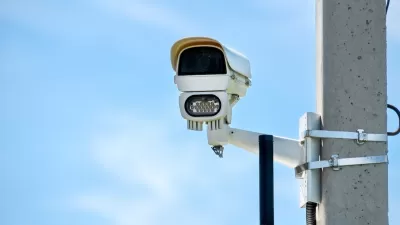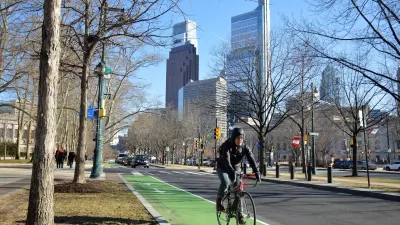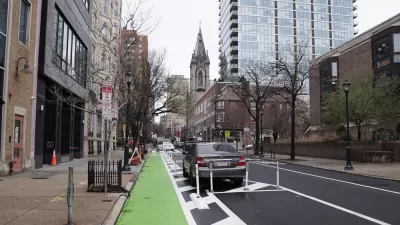City officials say serious crashes are down by 34 percent on streets that were the target of Complete Streets projects.

According to Philadelphia city officials, crashes with fatalities or serious injuries are down 34 percent on streets that received traffic calming projects, reports Thomas Fitzgerald in The Philadelphia Inquirer.
“That conclusion was based on comparing crash data on 35 stretches of roadway where the city or PennDot has built traffic-calming features with the number and severity of collisions on similar streets that were not changed,” Fitzgerald explains.
Anecdotally, residents living near the Cobb Creek Parkway, one of the streets that received a safety overhaul in 2021, say traffic is noticeably more tame.
The safety projects are part of Philadelphia’s Complete Streets initiative, which includes road diets, separated bike lanes, and Neighborhood Slow Zones, focused especially around schools. “Since the first two [Neighborhood Slow Zones] were installed in Fairhill and around Willard Elementary School in 2022, the zones have had no fatal or serious injury crashes. All reported crashes in the zones are down 75%.”
The city has a reserve of $220 million in state, federal, and local funding to continue building on Complete Streets projects over the next several years.
FULL STORY: Serious car crashes down 34% on Philly streets with traffic-calming measures, city says

Study: Maui’s Plan to Convert Vacation Rentals to Long-Term Housing Could Cause Nearly $1 Billion Economic Loss
The plan would reduce visitor accommodation by 25,% resulting in 1,900 jobs lost.

North Texas Transit Leaders Tout Benefits of TOD for Growing Region
At a summit focused on transit-oriented development, policymakers discussed how North Texas’ expanded light rail system can serve as a tool for economic growth.

Using Old Oil and Gas Wells for Green Energy Storage
Penn State researchers have found that repurposing abandoned oil and gas wells for geothermal-assisted compressed-air energy storage can boost efficiency, reduce environmental risks, and support clean energy and job transitions.

From Blight to Benefit: Early Results From California’s Equitable Cleanup Program
The Equitable Community Revitalization Grant (ECRG) program is reshaping brownfield redevelopment by prioritizing projects in low-income and environmental justice communities, emphasizing equity, transparency, and community benefits.

Planting Relief: Tackling Las Vegas Heat One Tree at a Time
Nevada Plants, a Las Vegas-based nonprofit, is combating the city’s extreme urban heat by giving away trees to residents in underserved neighborhoods, promoting shade, sustainability, and community health.

How Madison’s Tree Planting Efforts Are Growing a Healthier Community
Madison’s annual tree planting initiative is enhancing environmental resilience, public health, and community livability by adding 1,400 carefully selected trees citywide, with strong community and institutional support for urban forestry.
Urban Design for Planners 1: Software Tools
This six-course series explores essential urban design concepts using open source software and equips planners with the tools they need to participate fully in the urban design process.
Planning for Universal Design
Learn the tools for implementing Universal Design in planning regulations.
Ascent Environmental
Borough of Carlisle
Institute for Housing and Urban Development Studies (IHS)
City of Grandview
Harvard GSD Executive Education
Toledo-Lucas County Plan Commissions
Salt Lake City
NYU Wagner Graduate School of Public Service





























